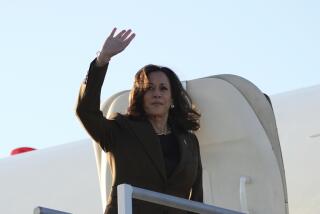Clinton Appeals to Big Donors to Rescue DNC
- Share via
WASHINGTON — President Clinton offered a private pep talk to about 40 of the Democratic Party’s most generous givers Wednesday night in an attempt to raise $250,000 from each of them to help retire the party’s record $16-million debt.
The appeal put Clinton in an awkward spot, coming a week after he had called on the Federal Election Commission to ban the very “soft money” contributions to political parties that he was soliciting.
The controversy over illegal contributions during the 1996 presidential campaign has plunged the Democratic National Committee into a full-blown financial crisis and left many potential donors hesitant to pull out their checkbooks.
Attempting to change its fortunes well in advance of next fall’s congressional elections, the national committee turned to its main attractions--Clinton and Vice President Al Gore--to inspire the party faithful.
“I believe you helped to contribute to a profound, almost revolutionary, positive change in the direction of our country,” Clinton said in brief opening remarks to the deep-pocketed crowd.
But his direct pitch for cash took place behind closed doors after reporters had been herded out of a ballroom at the Mayflower Hotel, where grilled beef and salmon were on the menu.
Already, the Democrats have returned about $1.5 million in questionable contributions. They intend to send back another $1.5 million in coming weeks. To make matters worse, the party is racking up major legal bills responding to three separate fund-raising investigations--by the House, the Senate and the Justice Department.
Outside the Mayflower, a group of protesters denounced Clinton and Gore as “hypocrites” who talk a good game about reforming the campaign-finance system at the same time they raise money with gusto.
“If President Clinton put as much energy into campaign-finance reform as raising soft money, we would be well on our way to a cleaned-up system,” said Ann McBride, president of Common Cause, the public-interest group that organized the demonstration.
Earlier in the day, White House Press Secretary Mike McCurry said that, until the current campaign-finance laws are changed, the Democrats must continue to raise soft money to stay competitive with Republicans, who have traditionally been more adept money-raisers.
“We’ve made it very clear that we will have to continue to raise and spend money within the current system until the system changes, either by the action of the FEC or by a change in federal law,” he said.
Recently, in response to the uproar over improper fund-raising, the DNC imposed a donor cap of $100,000 a year. Party officials said that the request for $250,000 from each supporter at Wednesday’s event complies with that earlier order because givers are being asked to spread their donations over two years and raise the rest from friends and associates.
While officials described the session as an opportunity for donors to vent their frustrations, there was a public display of unity.
“There’s no reason for me to turn around and walk away,” said Seattle businesswoman Laurie McDonald Jonsson, one of the few donors willing to talk with a reporter. “I’m here for the same reason I’ve been involved all along. My core beliefs are the same as the Democrats’.”
Len Barrack, a Philadelphia attorney and major donor, complained of relentless scrutiny by the news media of those who choose to participate in politics.
“I’m a longtime supporter of the party,” said Barrack. “I’m happy to donate.”
To reassure any givers who were reluctant to have their money used to compensate questionable donors, the Democrats said that only about 15 cents on every dollar collected would be used to retire the debt. The rest, party officials said, would go to a bold plan to win back the House and seize key offices in California, Arkansas, Nevada and Washington.
The president’s message, aides said, was that Democrats could not allow the current scrutiny of campaign fund-raising to give Republicans a strategic advantage in the critical 1998 congressional elections.
“Normally, in the year after the election cycle, people take a breather,” McCurry said this week. “And we’re going to say: ‘Look, we can’t take a breather. We’ve got to press ahead. We’ve got to deal with some of these financial conditions we face and we’ve got to get set for the ’98 cycle.’ ”
More to Read
Get the L.A. Times Politics newsletter
Deeply reported insights into legislation, politics and policy from Sacramento, Washington and beyond. In your inbox twice per week.
You may occasionally receive promotional content from the Los Angeles Times.










